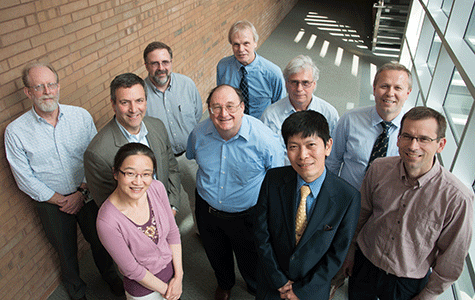
The Department of Psychiatry at Washington University School of Medicine in St. Louis is hosting a celebration Tuesday, Oct. 1, to mark the official launch of the Taylor Family Institute for Innovative Psychiatric Research.
The event is free and open to the public and will begin at 8 a.m. in the lobby and auditorium at the School of Medicine’s Eric P. Newman Education Center.
The institute, which is dedicated to advancing the science underlying the diagnosis and treatment of psychiatric illnesses, was created with a $20 million gift from Andy and Barbara Taylor and the Crawford Taylor Foundation, the charity of the entire Jack C. Taylor family.
“Barbara, our family, and I are proud to be a part of supporting this important initiative,” said Andy Taylor, chair of the Leading Together campaign and chief executive officer of Enterprise Holdings, the St. Louis-based company that operates the Enterprise Rent-A-Car, National Car Rental and Alamo Rent A Car brands. “This science holds great hope for many individuals, their families and generations to come.”
The institute includes nearly 40 members from four departments in the School of Medicine and is housed in the Department of Psychiatry. The researchers are conducting research to better understand the mechanisms through which neurosteroids act in the brain. Neurosteroids and related compounds called oxysterols occur naturally in the brain and are important in the functioning of brain networks for cognition, emotion and motivation.
Current evidence suggests that the production of neurosteroids in the brain is affected by stress and by particular disorders such as depression, so institute scientists believe that by replacing or enhancing these depleted steroids, they may be able to alleviate the stress response to help the brain function more normally.
“The exceptional generosity of the Taylor family has provided our investigators with the resources to focus on developing new and more effective therapies for psychiatric disorders,” said Larry J. Shapiro, MD, executive vice chancellor for medical affairs and dean of the School of Medicine. “Although many current medications are helpful, they also can have major limitations in terms of their effectiveness, and as with most drugs, they come with potential side effects. The scientists at the Taylor Family Institute are dedicated to finding new ways to develop psychiatric drugs that will be more effective and will have a lower risk of unwanted side effects.”
Although the institute has been operating officially for only a short time, research there already indicates potential dividends. Investigators from the Taylor Family Institute plan to present new findings about oxysterols at the national Society for Neuroscience scientific meeting later this fall.

A close relative of neurosteroids, oxysterols are molecules that are derivatives of cholesterol that can influence the activity of glutamate, a neurotransmitter in the brain.
“It appears oxysterols may have the potential to enhance cognitive function,” said institute director Charles F. Zorumski, MD, the Samuel B. Guze Professor of Psychiatry, professor of neurobiology and head of the Department of Psychiatry. “They appear to be potent and, apparently, selective modulators of glutamate receptors on brain cells, and the brain’s glutamate system is key to learning and memory and to many types of psychiatric illness.”
The keynote speaker at the celebration will be Steven M. Paul, MD, director of the Helen and Robert Appel Alzheimer’s Disease Research Institute. Paul also is the Burton P. and Judith B. Resnick Distinguished Professor of Neurodegenerative Diseases and professor of neuroscience, psychiatry and pharmacology at Weill Cornell Medical College of Cornell University.
Paul led the efforts of more than 8,000 scientists and physician investigators when he was the executive vice president of science and technology and president of Lilly Research Laboratories. Some of the company’s most successful new medicines were developed and launched under Paul’s leadership.
An author or co-author of more than 500 scientific papers and invited book chapters, Paul is one of the most highly cited scientists in the world. His research established an important role for specific neurotransmitter receptors in mediating the central actions of neuroactive drugs. His lecture is titled “Neuroactive Steroids and Oxysterols: Therapeutic Implications for CNS Drug Discovery.”
Psychiatric illnesses account for more than 40 percent of all disabilities. Heart and lung disease, stroke and cancer are obvious causes of death, but those end-stage illnesses often are related to alcoholism, nicotine dependence, drug abuse and other psychiatric problems. Motor vehicle accident deaths and violence also are associated with psychiatric illnesses, particularly alcohol abuse. And suicide, which takes the lives of more than 30,000 people in the United States each year, almost always is related to major psychiatric problems, such as depression and substance abuse.
The Taylor Family Institute for Innovative Psychiatric Research supports laboratory and clinical research involving collaborations between several departments at the School of Medicine. Core faculty members at the institute study natural and synthetic neurosteroid molecules, investigating those substances as potential anesthetic agents as well as possible treatments for psychiatric illnesses.
The investigators involved in the institute have expertise in several areas, including chemical synthesis, molecular biochemistry, ion channel biology, cellular and synaptic neurobiology and behavioral testing in animal models of illness.
Washington University School of Medicine’s 2,100 employed and volunteer faculty physicians are the medical staff of Barnes-Jewish and St. Louis Children’s hospitals. The School of Medicine is one of the leading medical research, teaching and patient care institutions in the nation, currently ranked sixth in the nation by U.S. News & World Report. Through its affiliations with Barnes-Jewish and St. Louis Children’s hospitals, the School of Medicine is linked to BJC HealthCare.